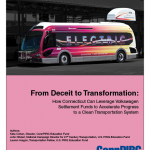From Deceit to Transformation
How Connecticut Can Leverage Volkswagen Settlement Funds to Accelerate Progress to a Clean Transportation System
A new report from ConnPIRG Education Fund finds that $51.6 Million from the Volkswagen (VW) settlement is headed to Connecticut to help clean up the state’s transportation system and recommends using the funds to purchase electric vehicle fast charging stations for the state’s highways along with an aggressive expansion of all-electric transit buses to replace aging, dirty, diesel buses.
Downloads
ConnPIRG Education Fund

Volkswagen (VW) perpetuated a fraud on the American people, deceiving consumers into believing that they were getting the best possible combination of performance and sustainability. But VW’s promises were nothing more than lies that significantly harmed our collective health and the health of our environment. Yet, their deceit now represents a historic opportunity to drastically reduce harmful pollution that makes us sick, destroys the planet, and provides an essential down payment toward the transition to a clean and modern 21st century transportation system.
This future, however, is not assured.
There remains a real risk that these funds will be wasted on outdated and polluting technologies, including those that rely on diesel and natural gas, while foregoing the transition to clean, all-electric vehicles (EVs) and supporting infrastructure. Indeed, of the numerous possible uses outlined in the VW settlement, many allow for the replacement of older dirty diesel technology with new, still dirty, diesel technology, compressed natural gas, or diesel-electric hybrids.[i]
Relative to all-electric vehicles, diesel and natural gas produce more significantly more tailpipe nitrogen oxides (NOX) and greenhouse gas (GHG) emissions as well as more total emissions over their lifecycle. In fact, in 2012, the International Agency for Research on Cancer classified diesel engine exhaust as carcinogenic to humans based on evidence that exposure increased the risk for lung cancer, highlighting the importance of transitioning away from diesel, in particular.[ii]
Accordingly, investing in diesel and natural gas technologies with VW settlement funds would represent a significant missed opportunity to accelerate the transformation to an all-electric, clean-running transportation network that could help reduce illness, save lives, and protect the planet. The VW settlement[iii] clearly envisions and encourages such a use. For instance, the Environmental Mitigation Trust (EMT), established under the VW settlement, can be used to subsidize 100 percent of the purchase of clean all-electric buses for use in public transit agencies throughout the country. Similarly, up to 15 percent of each state’s VW EMT funds may also be invested in the acquisition, installation, operation and maintenance of electric vehicle charging infrastructure, including along the states’ highways.[iv] Placing these publicly available charging stations on government owned property would allow the state to take advantage of the 100 percent subsidy provided under the VW settlement while reducing key impediments to the transition to an all-electric vehicle fleet.[v]
Given the structure of the VW settlement and its available uses, the overwhelming need to reduce harmful emissions that make us sick and destroy the planet, along with the opportunity to accelerate a market transformation toward an electrified transportation system, our report recommends that the maximum allowable amount (15 percent) be invested in fast charging electric vehicle infrastructure and the remaining amount (85 percent) be spent on new all-electric transit buses to replace older, outdated diesel buses.
Ensuring that the funds are used in this way has several distinct benefits including, but not limited to:
• Drastically reducing NOX, ground-level ozone (smog) and particulate matter to protect
our health and environment;
• Significantly reducing CO2 and other greenhouse gas (GHG) emissions;
• Reducing long-term fuel consumption, maintenance and operation costs of public fleet
vehicles;
• Adding needed stability to the price of energy inputs for vehicles;
• Increasing public awareness and adoption of EVs as cleaner alternatives to traditional
gas-powered vehicles.
[i] Allowable uses include replacing or repowering Class 8 Local Freight Trucks and Port Drayage Trucks; Class 4-8 School Bus, Shuttle Bus, or Transit Bus; Freight Switchers; Ferries/Tugs; Ocean Going Vessels (OGV) Shorepower; Class 4-7 Local Freight (Medium Trucks); Airport Ground Support Equipment, Forklifts, and Light Duty Zero Emission Vehicle Supply Equipment. See United States District Court Northern District of California, Partial Consent Decree, Appendix D-2, accessed at https://www.justice.gov/opa/file/871306/download (pg. 208-220).
[ii] World Health Organization, International Agency for Research on Cancer, IARC: Diesel Engine Exhaust Carcinogenic (press release), 12 June 2012, accessed at http://www.iarc.fr/en/media-centre/pr/2012/pdfs/pr213_E.pdf.
[iii] The VW settlement refers to the partial consent decree between Volkswagen and the U.S. Department of Justice over the affected 2.0-liter vehicles.
[iv] United States District Court Northern District of California, Partial Consent Decree, Appendix D-2, accessed at https://www.justice.gov/opa/file/871306/download (pg. 216).
[v] United States District Court Northern District of California, Partial Consent Decree, Appendix D-2, accessed at https://www.justice.gov/opa/file/871306/download (pg. 216).